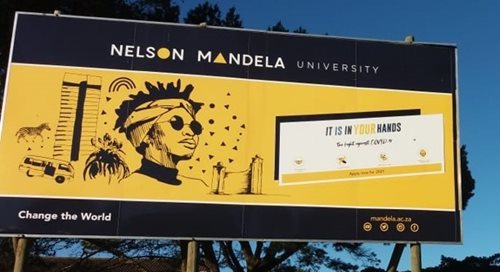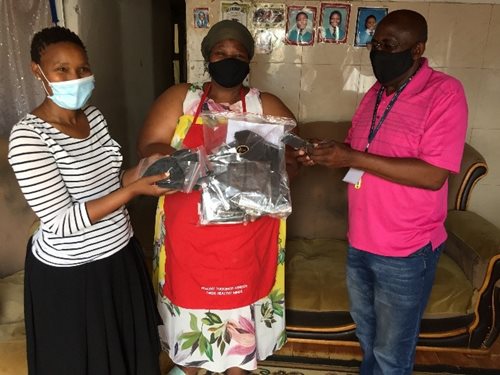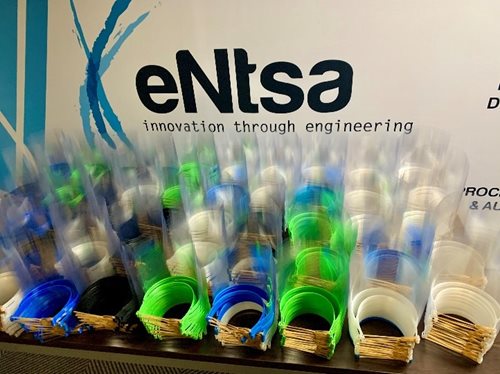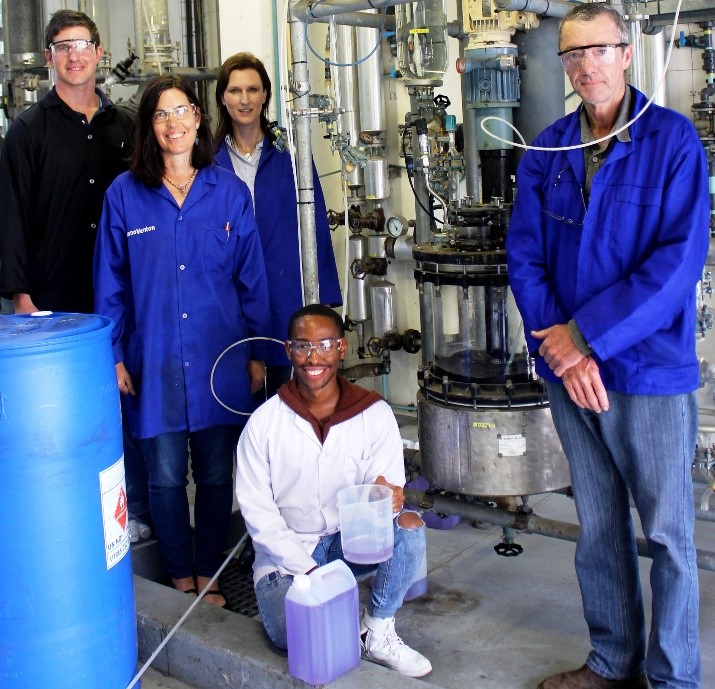The COVID-19 Coordinating Committee (CCC) was established on the 31st of March 2020 to coordinate and facilitate the University’s external response to the COVID-19 pandemic. Staff from across the University came together to find solutions in areas as varied as engineering, health sciences, communications, economics, visual arts and the physical sciences. To facilitate this, the CCC worked to build productive working relationships with government, the business sector, civil society, and other communities.
See the full report here: CCC 2020 Report.

Nelson mandela University Billboard: "It is in your hands".
Essential to the CCC’s work are the University’s values and the core mission of being in service of society. In light of this, the University’s interventions coordinated by the CCC respond to the realitie of inequality and unequal access to healthcare, protective equipment, educational resources, and food. In working towards the redress of such inequalities, the CCC co-travels with various stakeholders in pursuit of a re-imagined form of engagement.
The priority of the committee when it was first established was to provide food and material relief in the face of hard lockdown, economic crisis, and PPE shortages. A Community Convergence Workstream (CCW) was formed under the CCC to bring together the expertise and networks of those in the Engagement and Transformation Portfolio. The CCW’s first, urgent work was to distribute food parcels, funded by the Convergence Fund, established by the University as an avenue for staff members to contribute to COVID-19 initiatives.

Ikhala Trust and CCS meeting with Nasiphi Isipho Community Nutrition and Development in Motherwell, who received support in their nutrition programme along with sanitiser and masks.
The Visual Arts Department, with the assistance of funding from the MBDA, procured cloth masks from Braemore Designs for distributions to institutions and communities who needed them, and eNtsa used 3D-printing technology to produce face shields for distribution to healthcare facilities. InnoVenton was able to produce hand sanitiser both for internal use at the University and for distribution to external communities.
As infection numbers grew, it became clear that tracking and managing data would be an essential part of fighting the pandemic. Through the Centre for Community Technologies (CCT), the University played a vital role in providing ICT solutions for tracking, tracing and managing data related to COVID-19 cases, including at the Rev Dr Mamisa Chabula-Nxiweni Field Hospital. The Faculty of Science also engaged with COVID-19 data, producing models of the pandemic in order to predict the ‘peak’ and to understand the behaviour of the pandemic more generally. Prof Ronney Ncwadi and his team also worked with the provincial government modelling the economic effects of the pandemic.

3D-printed face shields.
The Communications and Marketing Department were able to provide educational resources on the pandemic for use in campaigns beyond the University space. These included resources promoting behavioural change, providing information about concepts and terms related to the pandemic.
As shortages began to become less acute and processes and resources to deal with the pandemic became established, the CCC shifted to thinking more long-term about how the networks and resources created in response to the pandemic could best be used to address the social inequalities and challenges under COVID-19 and beyond. Vaccinations became an important topic of discussion within the CCC, with the Communications and Marketing department working on informational resources on the vaccine for internal and external use. The Convergence Fund has begun a process of reconceptualization in order to fund long-term engagement projects, and the CCW work is being integrated into the Hubs of Convergence project and their work in areas such as sustainable food systems and citizen journalism are showing incredible potential for engagement work that has a meaningful impact on the communities working with the University. The question of water resources in light of the drought in the Metro is being addressed by the Chair for Sustainable Human Settlements, and the provision of psycho-social support in the province is also emerging as a key long-term concern.

Hand sanitiser formulation, production and logistics were carried out by InnoVenton staff.
The work within the CCC over the past year has provided many lessons pertinent to the University’s engagement mandate and philosophy that will serve it well as it responds to the ongoing challenges of C19. The cross-functional, transdisciplinary mode of work and connections that the CCC has established under the urgency of the pandemic also has the potential to be harnessed to engage with other societal challenges, and the members and partners of the CCC will continue to develop these.
André Keet
DVC: Engagement and Transformation Portfolio
CCC Chair
Jenny du Preez
Chair for Critical Studies in Higher Education Transformation
CCC Secretariat